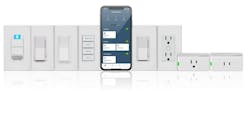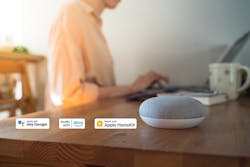Building the Case for Flexible Smart Home Technology
Whether they are included in the standard build, or are available in an upgrade package, smart home devices have shifted from “nice-to-have” to “must-have” for homeowners, and builders are likewise shifting their attention toward the actual devices they are specifying for builds. As millennials continue to make up the largest share of homebuyers (37%, according to the National Association of Realtors), it’s important for builders to keep the wants and needs of this generation with exceptional buying power in mind when creating smart homes.
There’s a multitude of options when it comes to smart home devices and technology, and being a tech-savvy generation, millennials have adopted a wide range of preferences when it comes to their connected devices. The key to ensure builders can appeal to this array of interests is to build with flexibility. Here are three considerations to help drive flexibility in smart home solutions:
1. Select voice assistant-agnostic solutions.
Often at the core of every smart home is a voice assistant-enabled smart speaker, allowing homeowners to say commands such as, “Dim the lights” for convenient, hands-free control of their homes. According to a survey from Cinch Home Services, millennials view the top three voice assistant providers as the most trusted smart home brands, but they are split fairly evenly across the three – Amazon (62.1%), Google (63.4%), and Apple (57.7%).
Without a clear voice assistant or smart speaker preference among millennials, it’s important to specify connected devices throughout the home that are able to support Amazon Alexa, Hey Google, and Apple HomeKit/Siri – whether it’s a doorbell, security camera, refrigerator, or light switches.
2. Allow for room to customize and grow.
While home buyers expect their new homes to have the proper smart home foundation and base, 87% of homeowners in a recent Security.org survey noted that they were planning on installing smart home devices in their new home, so they need flexibility to grow based on their own preferences and individual needs.
For this reason, it’s crucial that the base smart devices builders put into their new builds are ripe for customization and expansion in the future. A perfect example is Leviton’s Decora Smart Wi-Fi 2nd Gen product family of smart lighting controls and plug-ins. Smart lighting is a great base from which homeowners can build out an even smarter home, and by pre-enrolling devices in the My Leviton app for buyers, all homeowners need to do is create their preferred settings, routines, and scenes to enact while home or away. These Wi-Fi 2nd Gen devices are also compatible with Leviton’s Decora Smart Anywhere Companions. At any time, this wire-free solution allows homeowners to add additional light dimmer and switch controls throughout the home to meet their individual lifestyles and needs, such as a 3-way or multi-way control option at the top and bottom of a staircase or hallway.
3. Avoid device clutter – less is more.
The more equipment and devices that are required to power a smart home, the less flexible it will be for a homeowner one, two, or five years down the road. Focus on solutions that work seamlessly with other leading smart home brands and that don’t require a hub or bridge that takes up valuable space in a home. Also consider specifying devices that combine several smart home features into a single device. For example, if you know your buyer’s preference for a voice assistant is Amazon Alexa, opt to install an Alexa-enabled Voice Dimmer to avoid the clutter of a separate smart speaker in rooms like a bathroom or bedroom where counter space is coveted.
Laying the foundation for a flexible smart home will allow you to attract a wide range of buyers based on their current wants and needs, while still allowing for their individual customization and growth in the future. For more information on how smart lighting controls can support a flexible smart home, visit Leviton's Residential Builders site.


